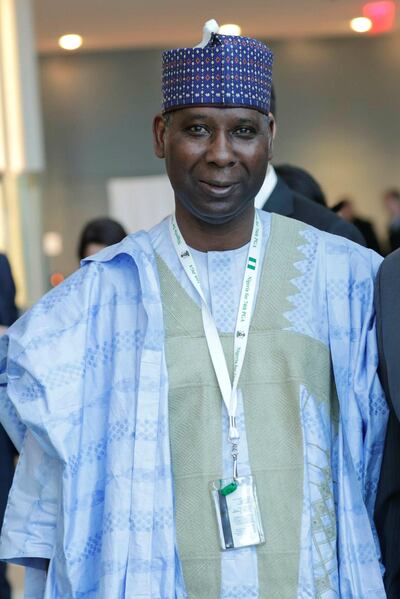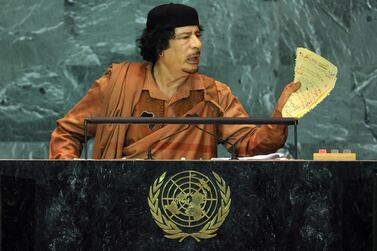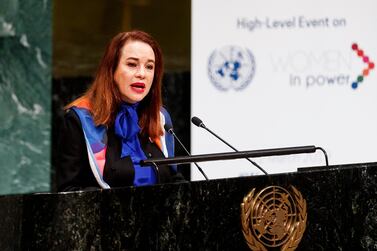The UN General Assembly, the main decision-making body of the United Nations, is meeting.
Each of the UN’s 193 member countries have a vote to pass resolutions on issues of importance to the world's population. They are meeting at UN headquarters in New York.
Highlights this year include a climate summit on Monday 23 September followed by several days of speeches by leaders or representatives of UN member states, who will each address the chamber in the annual General Debate.
What is the United Nations General Assembly?
The UNGA is also made up of boards, commissions, committees, councils, panels and working groups. The subject of these sub-bodies will focus on both the running of the General Assembly and discussion of priorities and issues.
The first assembly took place in January 1946, with 51 world leaders including the UK’s post-war prime minister Clement Atlee and Prince Fahd of Saudi Arabia, gathering in London to discuss world affairs.
Many of the issues discussed in the first session remain on the programme of discussion today, including refugee rights, nuclear disarmament and peacekeeping.
What is the General Debate?
Every year the representatives from each member state - often the head of state - take turns to address the assembly in a General Debate lasting five days.
Each speech is allotted 15 minutes, although they can overrun. The longest speech in UNGA history was made by the Cuban leader, Fidel Castro, lasting for more than four hours.
The General Debate has played host to some of the fiercest speeches in political history. In 1974 Palestinian President Yasser Arafat became the first head of state, but not member of the UN, to deliver a speech, famously making the call for the Palestinian right to statehood.
"Today I came to you with an olive branch of the world in one hand and a weapon of a freedom fighter in another ... Do not let the branches of the world fall out of my hand," Arafat said.
The late Libyan leader Muammar Qaddafi threw a torn copy of the UN charter in the air during his 2009 speech while demanding equity between permanent members of the Security Council and the rest of the UN. During his 90-minute speech he called the Security Council a "Council of intimidation”.
What is the theme of the UN General Assembly General Debate 2019?
This year’s theme, as decided by the new UNGA president is: “Galvanising multilateral efforts for poverty eradication, quality education, climate action and inclusion.”
The day before the General Debate kicks off, a dedicated Climate Action Summit and a one-day meeting on universal health coverage will be held, with high-level international attendance expected.
We will be publishing full details of the schedule of speakers in the coming days. It is an UNGA tradition that Brazil opens the debate - this year on Tuesday 24 September - and is followed by the United States.
When and where does the UNGA meet?
UNGA meets from September to December each year, and then from January to August as required.
The 74th session of the UNGA will open on September 17 2019. The first day of high-level debate will begin on September 24.
It takes place in the UN's permanent headquarters in New York, where it has been held since October 1952.
Who is Tijjani Muhammad-Bande, president of UNGA?
Nigerian diplomat and academic Tijjani Muhammad-Bande took over from Ecuadorian Maria Fernanda Espinosa as President of UNGA this month. He will hold the position for a year, and has decided the theme of the 74th session.

Mr Muhammed-Bande holds a doctorate in political science and led Nigeria’s National Institute for Policy and Strategic Studies until 2016.
He is no stranger to the inner-workings of the UN. He served as vice-president to the General Assembly for its 71st summit in 2016 and as Nigeria’s Permanent Representative to the UN from 2017 until his election to lead UNGA in June.
The 61-year-old professor wants to reform the Security Council, making it a more democratic and efficient arm of the UN.
The 15-nation body has struggled to pass meaningful resolutions in the past few years, with permanent members China, Russia, France, the US and UK often at loggerheads.
“We have to have the reform, it is a democratic process. We have to continue and not lose sight of the goal, which is to have fair, just and quick reform of the Security Council,” he said in June.
How does the UNGA make decisions?
Each of the member nations has one vote. Votes taken on important issues like peace and security, admission of new members and budgetary matters require a two-thirds majority, while other questions are decided with a simple majority.
Recently UNGA has been attempting to reach a consensus instead of relying on a formal vote. The president can decide to adopt a motion without a vote after conferring with the appropriate delegations.
What powers does UNGA have?
UNGA can make recommendations to member states on international issues. It can initiate actions on political, economic, humanitarian, social and legal issues.
For example, in 2000 UNGA announced the Millennium Development Goals – targets for member states to achieve levels of development and peace. These were followed up in 2015 with a set of 17 Sustainable Development Goals.
UNGA also:
- considers and approves the UN budget
- elects non-permanent members of the security council
- discusses questions of international peace and security, and of the scope of the UN Charter, unless the Security Council is currently discussing it
- initiates studies into international issues
- makes recommendations for the peaceful settlement of any situation
considers reports from other bodies







